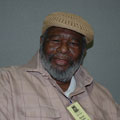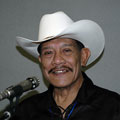Home | Programs | Individual Creativity
2005 Ohio Heritage Fellowship Recipients
Performing Arts
 WALLACE COLEMAN was born in 1936 in Morristown, Tennessee, and first heard the blues on late-night radio programs on WLAC from Nashville. He was especially impressed as a boy by harmonica players Sonny Boy Williamson, Little Walter Jacobs and Big Walter Horton and singers Muddy Waters and Howlin' Wolf. For most of his life, however, making music took a back seat to earning a living and Coleman played primarily at home for his own enjoyment. It was not until 1985, almost 30 years after Coleman had moved to Cleveland, that he first began performing regularly in public, with local bluesman Guitar Slim at the Cascade Lounge in Cleveland.
WALLACE COLEMAN was born in 1936 in Morristown, Tennessee, and first heard the blues on late-night radio programs on WLAC from Nashville. He was especially impressed as a boy by harmonica players Sonny Boy Williamson, Little Walter Jacobs and Big Walter Horton and singers Muddy Waters and Howlin' Wolf. For most of his life, however, making music took a back seat to earning a living and Coleman played primarily at home for his own enjoyment. It was not until 1985, almost 30 years after Coleman had moved to Cleveland, that he first began performing regularly in public, with local bluesman Guitar Slim at the Cascade Lounge in Cleveland.
A master of the Chicago school of blues harp who sounds like he just stepped off a 1950s Chess record, Coleman also is a clever songwriter and effective singer. He joined forces with legendary blues guitarist Robert Jr. Lockwood in 1987 and spent the next decade touring with the veteran showman, who learned guitar directly from Robert Johnson. The only harp player Lockwood has ever had in his band, Coleman played on such Lockwood albums as / Got To Find Me A Woman and What's The Score before striking out on his own in 1997. As a bandleader, Coleman keeps the traditional blues flame alive by appearing at clubs, colleges and blues festivals throughout the U.S. Coleman has recorded three well-received albums for his own label, Pinto Blue Music: Stretch My Money, Live at Joe's and The Bad Weather Blues.
Performing Arts
 Cincinnati piano man 'BIG' JOE DUSKIN is the reigning king of the blues in the Queen City. Born in Birmingham, Alabama, in 1921, Duskin grew up in Cincinnati, where he began playing piano at an early age in his preacher father's church. Young Joe was keenly interested in the blues of Roosevelt Sykes and Memphis Slim and the boogie-woogie of Pete Johnson, but his father viewed that as "the Devil's music." Finally, they came to a truce when Joe promised his septuagenarian father that he wouldn't play the blues while his father was alive. Reverend Perry Duskin lived to be 105, so Joe Duskin had a career as a policeman and postal worker instead of a blues musician.
Cincinnati piano man 'BIG' JOE DUSKIN is the reigning king of the blues in the Queen City. Born in Birmingham, Alabama, in 1921, Duskin grew up in Cincinnati, where he began playing piano at an early age in his preacher father's church. Young Joe was keenly interested in the blues of Roosevelt Sykes and Memphis Slim and the boogie-woogie of Pete Johnson, but his father viewed that as "the Devil's music." Finally, they came to a truce when Joe promised his septuagenarian father that he wouldn't play the blues while his father was alive. Reverend Perry Duskin lived to be 105, so Joe Duskin had a career as a policeman and postal worker instead of a blues musician.
Duskin began playing again in the 1970s, delighting club and festival audiences with his powerhouse mix of blues, boogie-woogie and barrelhouse piano. His first album, an instant classic called Cincinnati Stomp, was released by Arhoolie in 1979, making Big Joe an international blues star at the age of 58. He began making annual tours through France and Germany and played the major U.S. festivals, including the New Orleans Jazz & Heritage Festival and the Chicago Blues Festival. Duskin's subsequent recordings have included Don't Mess with the Boogie Man, Down the Road a Piece and his most recent, Big Joe Jumps Again, was nominated for a W.C. Handy Award. Last summer, Duskin was presented a Key to the City by Cincinnati's mayor.
Performing Arts
 Born in San Antonio, Texas, in 1943, JESSE PONCE grew up in the heart of conjunto music, a traditional accordion-led style of Tejano (or Tex-Mex) music. His first performing was done with Conjunto Ponce, a family band led by his father Encernacion Ponce, a violinist and accordion player born in Monterrey, Mexico. Jesse began playing the bajo sexto (12-string guitar) at age seven, though today he is best known as an accordionist. In 1964 Ponce joined the band of conjunto superstar Flaco Jimenez and worked with him for three years. The two reunited in 1977, when Jimenez was playing with acclaimed roots musician Ry Cooder. This association led to a European tour, an appearance on "Saturday Night Live" and a live album.
Born in San Antonio, Texas, in 1943, JESSE PONCE grew up in the heart of conjunto music, a traditional accordion-led style of Tejano (or Tex-Mex) music. His first performing was done with Conjunto Ponce, a family band led by his father Encernacion Ponce, a violinist and accordion player born in Monterrey, Mexico. Jesse began playing the bajo sexto (12-string guitar) at age seven, though today he is best known as an accordionist. In 1964 Ponce joined the band of conjunto superstar Flaco Jimenez and worked with him for three years. The two reunited in 1977, when Jimenez was playing with acclaimed roots musician Ry Cooder. This association led to a European tour, an appearance on "Saturday Night Live" and a live album.
A resident of Toledo since 1979, Ponce took up the three-row button accordion in the early 1980s since there were so few players in northwestern Ohio. He still plays bajo sexto occasionally with Amanda Reyna y los Reyes Ritmo, but he's more frequently found playing his beloved rancheras and polkas on his squeezebox. He currently performs with Baldemar Velasquez in the Aguila Negra Band, with Jacob Estrada and Frank Ibarra in Sal y Pimienta and as the "house musician" at the Sofia Quintero Art and Cultural Center in Toledo. In addition to his performing activities, Ponce has long been an active and central part of the Latino community in northwestern Ohio, mentoring young musicians, working with the Farm Labor Organizing Committee and participating in countless benefit concerts.
[top]